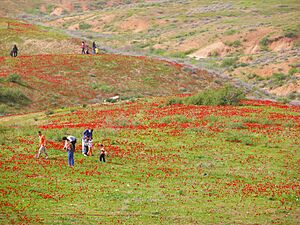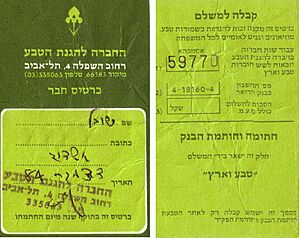Society for the Protection of Nature in Israel facts for kids
The Society for the Protection of Nature in Israel (SPNI) is a non-profit group in Israel. It works to protect plants, animals, and natural places. SPNI helps keep different kinds of living things safe. It does this by protecting the land and water they need to survive. SPNI is the oldest and largest nature protection group in Israel.
Contents
How SPNI Started
SPNI was created in 1953 by Azaria Alon and Amotz Zahavi. They started it because there were plans to drain the Hula Valley. The government wanted to drain most of the Hula wetlands. This was to stop malaria and create land for farming.
After 40 years of SPNI working hard, about 10% of the Hula wetlands were refilled with water in the early 1990s. This was a big success!
In 1980, SPNI, along with its founders and Yoav Sagi, won the Israel Prize. This award was for their special work in protecting the environment in Israel.
What SPNI Does
SPNI is well-known for leading nature hikes. Today, most hikes are in Hebrew. The Jerusalem branch offers some regular tours in English. SPNI also works on important environmental issues and helps improve the environment.
For example, they helped create a farming plan for the Hula Valley. This plan helps keep migrating common cranes healthy. They also stopped the draining of salt pans. These pans were the last place in Israel where Nubian nightjars could lay their eggs.
A big achievement was helping create the 2004 Coastal Law. This law stops new buildings within 300 meters of the coastline. SPNI has almost 800 employees. It is a very large non-profit group with many different activities. Because of this, people often know SPNI by the names of its different parts.
Protecting the Environment
SPNI's Environmental Protection Division (EPD) acts like a watchdog. It works to protect the few open spaces left in Israel. Many people have moved to Israel. This has put a strain on water, led to more building, and caused traffic and pollution.
Israel is now a very urban country. It has one of the highest population densities in the world. The EPD works to find smart ways to protect Israel's delicate natural world.
Rivers and Waterways
Israel's rivers are in trouble. Water is taken from them for homes, farms, and factories. Sewage and other waste are often dumped into rivers. Plans to protect rivers are sometimes delayed. Also, building too close to rivers harms them and their habitats.
SPNI's River Rehabilitation Campaign studies these problems. It suggests solutions and works with other groups to create a master plan. They also teach the public about how to manage rivers and water.
Protecting the Coast
The Mediterranean coast is a favorite place for Israelis and tourists. Building marinas, homes, and private beaches can stop people from enjoying the coast. SPNI works at all levels to keep Israel's beaches clean and natural. They also make sure everyone can access them.
Sea of Galilee and Kinneret Trail
The Sea of Galilee is Israel's main source of fresh water. It is also a beautiful spot. For years, it has been threatened by too much water use and building on its beaches. SPNI's Lake Kinneret Project brings together all groups involved. They work to keep the Kinneret's water levels healthy. They also ensure its shoreline stays open to the public for the future.
City Parks
SPNI helps create and protect new Metropolitan Parks in central Israel. They work to make these areas legal parks. They also help build things like paths in public areas. This is so people in crowded cities can have parks close to their homes. This project aims to create 8 open spaces in Israel's busy central region. These will be places for fun, nature, and sports.
Legal Work and Lobbying
SPNI has a team that deals with legal questions. They use laws to help protect Israel's natural resources. This legal team also helps SPNI's projects. For example, they have people who represent environmental interests on planning committees. They also work with wildlife and bird centers.
Transportation and Air Quality
Traffic jams and air pollution cause health problems. SPNI works to create better city transportation. They promote public transport and new ways to build roads. This helps reduce pollution.
Open Landscape Institute
Land is very valuable in Israel. Developers want to build on it. SPNI is on the front lines, protecting untouched land. This land is important for wildlife, birds, and outdoor fun. They also support smart development. This means homes can be built without cutting down forests that Israel has worked hard to plant.
Birding Division
About 500 million birds fly through Israel's skies twice a year. This makes Israel a very special place for bird watching. SPNI, through its Israel Ornithological Center (IOC) and International Center for the Study of Bird Migration (ICSBM), helps protect birds. They work to save bird species threatened by cities and building.
SPNI also supports the Champions of the Flyway. This is an international birding competition and fundraiser. It raises money to help stop illegal hunting of migrating birds around the Mediterranean Sea.
Israel Ornithological Center (IOC)
The IOC started in 1980. It works to save endangered birds like the Lesser Kestrel and cranes. The IOC has many successful projects. These include fixing and protecting bird homes. They also do research and surveys. They run many education programs in schools across Israel.
International Center for the Study of Bird Migration (ICSBM)
This center at Latrun was started by Yossi Leshem. He was the head of SPNI from 1991 to 1995. He is still the center's director and a researcher at Tel Aviv University. The ICSBM is a joint project of SPNI and Tel Aviv University. The center works on many new and creative education projects. These include studying bird migration, flight safety, nature education, ecotourism, and working with other countries.
Education Programs
SPNI's education programs reach Israelis of all ages. Over half of Israeli children and teens are part of SPNI's programs! SPNI believes that by helping young people connect with the land and their communities, they will grow up to protect Israel's natural treasures.
Children Make a Difference
In this program, students actively take part. They connect with other students from all over Israel at big events like the yearly children's conference. This has created a national group of young people who care about the environment. They join environmental campaigns and events. Schools that take part must also adopt green practices and work with their community.
A Beautiful Israel
Across Israel, children and young people work to clean up the environment. "A Beautiful Israel" teaches kids to adopt sites, use resources wisely, and clean up litter. This is all part of their nature education.
Obligated to the Environment
All Israeli 10th graders must volunteer in their local communities. They need to do at least 60 hours during the school year. This is part of a national program called "Personal Accountability." It teaches young people about being good citizens. SPNI's "Obligated to the Environment" program lets students choose environmental work for their volunteer hours.
Orienteering
SPNI's youth group uses nature education to help create future leaders for a sustainable Israel. From Afula to Beer Sheva, Orienteering groups meet weekly. They also go on about 18 hikes each year.
Multicultural Orienteering
These programs offer lessons and field trips for Ethiopian and Caucasus youth. They help them fit in and learn about Israel. Donors help fund these activities. They help young people feel like they belong and become stronger by facing physical and emotional challenges.
Eco-Community Centers
These centers are known as MaLaShim in Hebrew. SPNI runs about a dozen of them. They mainly serve towns that have fewer social services. People in these towns often face challenges like unemployment. Malashim offer fun activities about nature and the environment, both in and after school. They also have nature trips for the whole family sometimes. For over 30 years, Malashim have been a key part of local education. Some Malashim bring together Jewish and Arab children. Some also help people in areas affected by terrorism, like Sderot.
City Branches
Leading environmental activities in Israel's big cities is a key part of SPNI's work. SPNI staff run urban eco-centers. From these centers, they work with people to raise awareness about environmental issues. They also run educational activities for children, teens, and adults. This helps people feel proud of and connected to the land.
These centers also help SPNI organize local activities. They take part in city planning and promote environmental issues with local governments. SPNI's main branches are in Jerusalem, Tel Aviv, Be'er Sheva, Haifa, and Modi'in.
In 2011, the Russian government asked SPNI to leave its offices in Jerusalem. These offices were in the Sergei Courtyard complex.
Nature Tourism
SPNI is known for its network of field schools. These schools are named after their locations:
- Alon Tavor near Kadoorie Agricultural High School
- Eilat
- Ein Gedi
- Golan near Snir
- Har Hanegev in Mitzpe Ramon
- Hatzeva
- Hermon in Katzrin
- Ma'agan Michael (no overnight stays)
- Mount Meron
- Ofra (no overnight stays)
- Shikmim/Shiqmim (no overnight stays) at Nitzanim (see Ashdod Sand Dune)
These schools are next to some of Israel's nature reserves and national parks. Thousands of Israelis and tourists go on SPNI's guided hikes and walks. These trips focus on learning about nature.
SPNI's Field School system has three main goals:
- Education: Teaching young people and adults about the region.
- Conservation: Protecting the natural environment of the region.
- Research: Gathering information about the region with other SPNI departments.
Field Schools are a very important part of SPNI's work. They are a main spot for local nature activities. They also play a big role in nature tourism and education in Israel.
The Jerusalem Bird Observatory offers tours in English.
Israel Trails Committee
The Israel Trails Committee (ITC) marks and takes care of 10,000 kilometers of paths. This includes 950 kilometers of the Israel National Trail. A few full-time SPNI employees work in the field. They mark and fix trail markers from the Galilee to the Negev desert.
SPNI's Logo
The Iris haynei (also called the Gilboa Iris) was chosen as the logo for the Society for the Protection of Nature in Israel.
See also
- Israel Union for Environmental Defense
- List of Israel Prize recipients
- Wildlife of Israel
 | Georgia Louise Harris Brown |
 | Julian Abele |
 | Norma Merrick Sklarek |
 | William Sidney Pittman |



